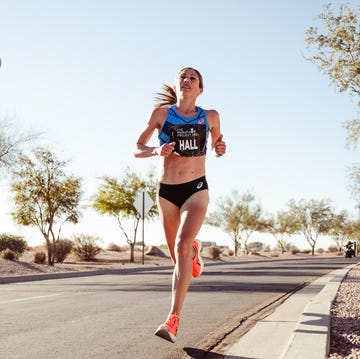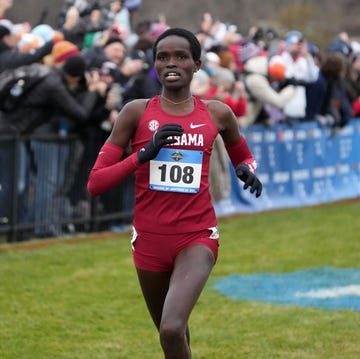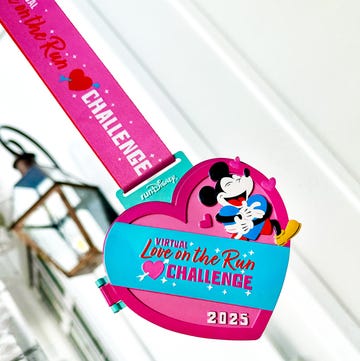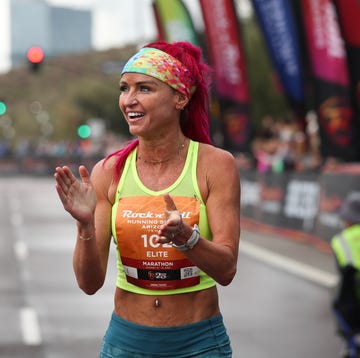One of the most decorated U.S. runners in history, Suzy Favor Hamilton was an Olympian in 1992, 1996, and 2000. During her long career, the mid-distance specialist set PRs of 1:58.10 for 800 meters, 3:57.40 for 1500 meters and 15:06.48 for 5000 meters. She lives in Madison, Wis., with her husband, Mark, and their daughter, Kylie. She and Mark are real estate agents. She is also a motivational speaker.
This is the second of six interviews we'll have with former U.S. Olympians as we build toward the Olympic Track Trials later this month. Next up: Tim Broe.
DAA Industry Opt Out.
Suzy Favor Hamilton: I have three careers that I’m enjoying now, but it wasn’t so easy for me after my running ended. I had my daughter, Kylie, six years ago. I didn’t realize that when I stopped running I was suffering from depression. I had the child, new job, moving—all of these pressures in my life—and the depression hit me really hard. I suffered for eight months without doing anything, thinking that I could snap out of it. I couldn’t run during that time. The depression took over and took the running away from me. As much as I wanted to, I couldn’t get my body to do it.
I finally sought some help, went through therapy for about a year and just came out on the other side with a new perspective on my life. I am healthier and happier than I have ever been. I needed to go through this period of not running. Again, it wasn’t my choice to not run—the depression made me not run. My husband even said, "Why don’t you just run?" And I’d go to my treadmill in the basement and curl up in a ball and cry because I didn’t have the energy or drive to get on it.
During your career, how did the depression impact your running?
SFH: Running was everything. I had all of my eggs in one basket. Running became my drug for the depression. I had to run every day to feel good. When I started taking medication it took that process out of my head where I was always fighting with myself, “Oh, you have to run every day.” The medication made it so I could relax and not worry so much that I had to train to feel good. Now if I don’t run for two days, it’s not a big deal.
Running Shoes - Gear?
SFH: Always trying to be on a podium is where I lived before, and I don’t live on that podium anymore. I had some very rough times. When I was depressed there were inklings in me of trying to find a solution without going the right way, like alcohol was going to possibly be that solution—if I just self-medicate myself with alcohol I’ll be fine. I sampled in that and realized that was not the healthy way. The healthy way was getting professional help, going to the doctor, to the psychologist, to really tackle this and be brave.
Some runners I’ve spoken to have said their bodies forced them to retire before they felt like they were mentally ready to. What about you?
SFH: I retired at 36 and I think that is late for most runners. I’m fortunate I made it that long in my career. I wanted to retire so badly. I was so done mentally with the sport. The last four years of my career I kept going because it made me feel good and I was paid well, but I wasn’t loving it like I once did. The injuries got to me. I wanted a child. I wanted a normal life. But I tried to milk it as long as I could.
I realized, after I moved on, I am so much happier than I have been. I’ve found that I am good at other things. I don’t have to rely on running to define who I am. When people acknowledge all of my accomplishments, I am really proud of them, but I am so much prouder of the things I am doing now in my life.
When running was your job, did you it feel like a job?
SFH: Everybody says you don’t run for the paycheck and obviously you don’t, but when the running starts affecting everything it becomes a little too much. If I wasn’t ranked #1 in the U.S. my salary would get cut in half. What kind of pressure is that? Or, if I wanted to have a child, they would take away my salary for that year. It really starts to interfere with your quality of life. So when you no longer have to live by those standards it is a freeing experience.
At the same time, I can’t rip on the companies that sponsored me because they gave me the opportunity to be a professional runner. Obviously, life isn’t perfect and to be able to be sponsored for as many years as I was is an amazing feat. It has given me this new perspective that I can handle anything in life. Those companies, with their tough contracts, have given me this strength, and I wouldn’t tell these companies to change their contracts in any way. It’s all about the strongest survive and that is how life is.
How to Watch the NCAA XC Championships?
SFH: My mental frame wasn’t perfect my whole career, and it will never be perfect. But when I look back at what I did with those issues in my head I am flabbergasted. How did you do that Suzy? You are so super tough that you were able to get through that the way you did. I look at myself more through my toughness than my accomplishments.
Do you still run?
SFH: Now, I run a different way. I run slow and long. Maybe 8:00 or 9:00 pace. I am working with Disney and the Rock ’n’ Roll marathons. Doing the races with them has motivated me to do half marathons.
Now that you no longer have to worry about injuries knocking you off the track, what pursuits have you tried recently?
SFH: I am big into rollerblading and speed skating with my daughter. I also love downhill skiing. I love running on our treadmill. It could be the nicest day and I’m running on our treadmill because I’m into keeping my face out of the sun, whereas before I was a sun goddess.
Now I’m like a kid in a candy store. What do I want to try next? Last year, my husband and I went skydiving on our 20th wedding anniversary. I would have never gone skydiving in my running career. I have decided to live my bucket list at age 43 rather than 80. I want to live now. No regrets.














